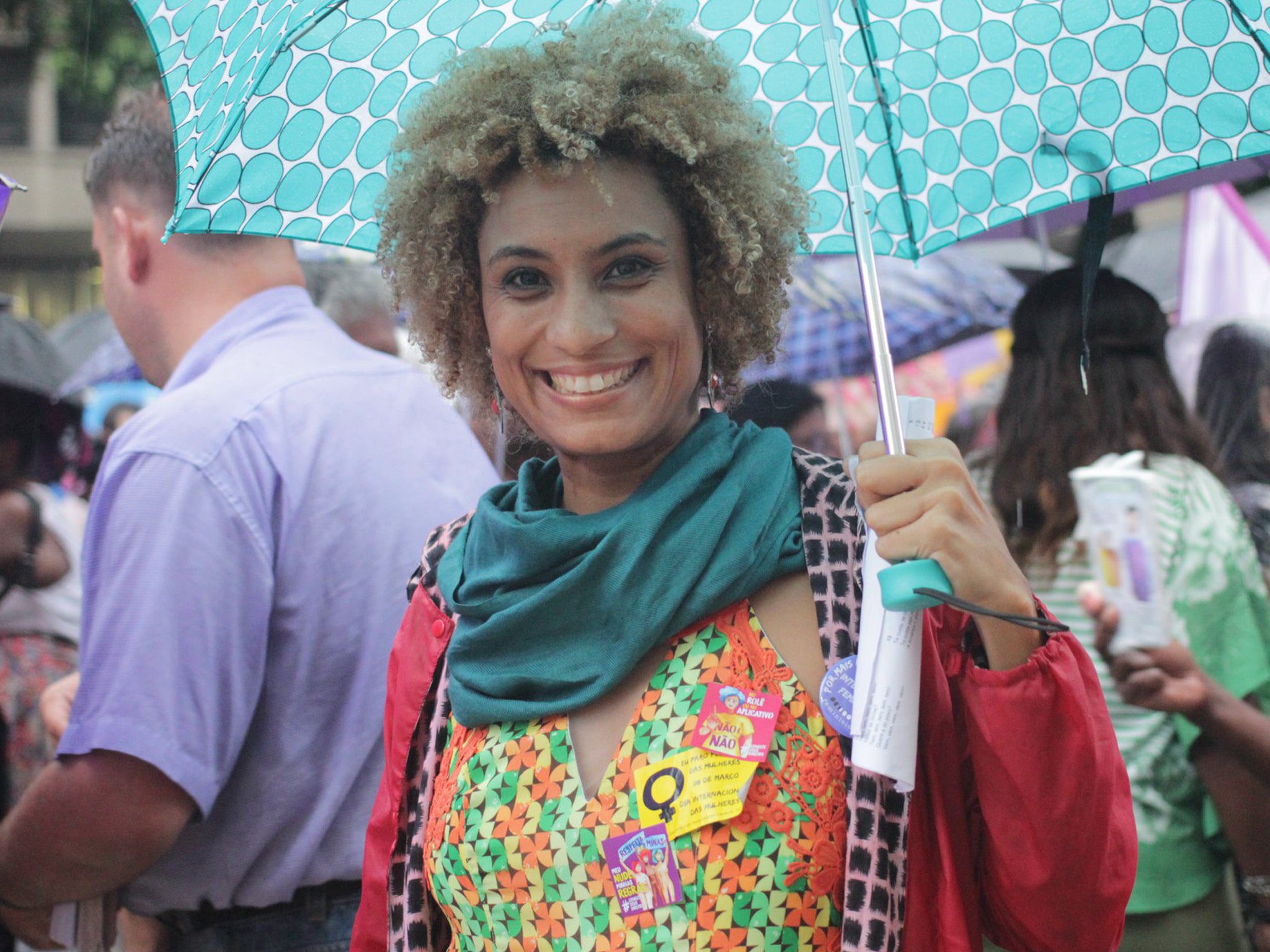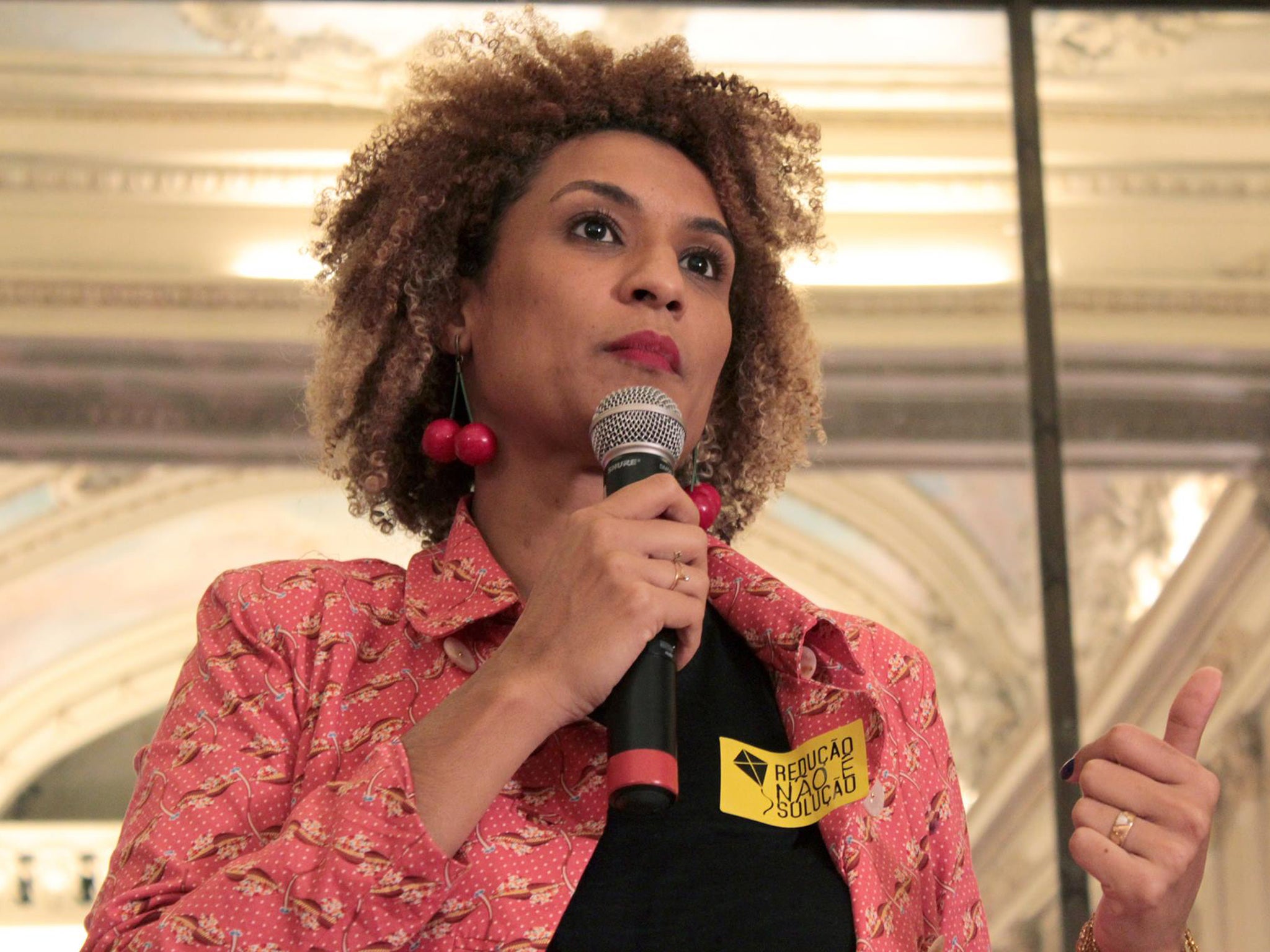Marielle Franco: Why my friend was a repository of hope and a voice for Brazil's voiceless, before her devastating assassination
As thousands take to the streets of Rio and São Paolo to protest the politician’s brutal murder, Glenn Greenwald remembers a formidable and fearless advocate for Rio’s poorest citizens

Your support helps us to tell the story
From reproductive rights to climate change to Big Tech, The Independent is on the ground when the story is developing. Whether it's investigating the financials of Elon Musk's pro-Trump PAC or producing our latest documentary, 'The A Word', which shines a light on the American women fighting for reproductive rights, we know how important it is to parse out the facts from the messaging.
At such a critical moment in US history, we need reporters on the ground. Your donation allows us to keep sending journalists to speak to both sides of the story.
The Independent is trusted by Americans across the entire political spectrum. And unlike many other quality news outlets, we choose not to lock Americans out of our reporting and analysis with paywalls. We believe quality journalism should be available to everyone, paid for by those who can afford it.
Your support makes all the difference.One of Brazil’s most promising, charismatic and beloved political figures was brutally murdered on Wednesday night in downtown Rio de Janeiro, in what officials have concluded was a targeted political assassination. City Councilwoman Marielle Franco, 38, was killed instantly when her car was pummelled by drive-by shooters with nine bullets, four of which entered her skull. Her driver, Anderson Pedro Gomes, 39, was also killed.
Franco was killed at roughly 9:30pm, after leaving an event entitled “Young Black Women Who Are Changing Power Structures”. Police believe that she was monitored by her killers from the time she left the building, which is how they knew exactly where she was sitting in the car ensconced by tinted windows.
Franco’s killing has shaken Brazil to its core at a time when the country is reeling from a massive corruption scandal, a seemingly endless political crisis, a years-long economic recession, and now an epidemic of spiralling violence.

The brazen assassination took place on the streets of Rio de Janeiro just one month after Brazil’s President, Michel Temer, ordered the military to occupy the city in order to stabilise security, the first time since the end of Brazil’s 21-year-long military dictatorship in 1985 that its military has “intervened” in a major city.
Franco vehemently denounced the military intervention and was just appointed to lead a commission investigating its possible fiscal abuses.
But what is most notable, and most devastating, about Franco’s murder is how improbable and unique her trajectory was to the public stage. A black LGBT+ woman in a country notoriously dominated by racism, sexism and traditional religious dogma, she was raised in one of Rio’s largest, poorest and most violent slums, the Maré complex.
She became a single mother at the age of 19, but graduated college, obtained a masters in sociology, and then became one of the city’s most effective human rights activists, leading often dangerous campaigns against pervasive police violence, corruption and extra-judicial murders that targeted the city’s poor, black residents with whom she grew up.
As she became increasingly political, Franco joined Brazil’s new left-wing party, the Party of Socialism and Liberty (PSOL), and quickly became one of its stars.
In 2016, she ran for public office for the first time as a candidate for Rio’s city council and was elected with a massive vote. The results stunned the city’s political class: as a first-time candidate, a black woman from Maré became the fifth most-voted candidate in the city (out of more than 1,500 candidates, 51 of them were elected).
That success solidified Franco’s status not only as a new political force to be reckoned with, but as a repository of hope for Brazil’s traditionally voiceless and excluded groups: its favela residents, its black and poor people, and women.

Upon assuming office Franco immediately used her new platform to focus on what had become her life’s work: investigating, denouncing, and organising against police violence inflicted on the city’s poor, black residents.
Days before her assassination, she went to Acari, a sprawling Rio slum, to protest recent murders by one of the city’s most notoriously violent and lawless police battalions. What makes it difficult to determine exactly who killed Franco was precisely her bravery: she was a threat to so many violent, corrupt, and powerful factions that the list of possible suspects, with motives to want her dead, is a long one.
Franco’s killing is a horrific loss for Brazil and for Rio, but it is also devastating for my family. My husband, David Miranda (famously detained by UK authorities at Heathrow Airport in 2013 under Schedule 7), was elected to the Rio city council at the same time as Franco was, as part of the same party. Their backgrounds are extremely similar: like Franco, David grew up in one of Rio’s worst slums, though did so as an orphan, and was the first openly gay person elected to the city council.
They spoke often of recruiting more candidates like themselves to PSOL, which, like many left-wing parties in the West, has had difficulty reaching beyond the wealthy and intellectual leftist enclaves to touch the poor people, the workers, the minorities on whose behalf they claim to speak, in part because so few of the party’s representatives actually come from those places.
Marielle and David’s chairs in the city council chamber were next to each other’s and they became not only comrades, working on the same projects, but best friends. As she did for so many people across Rio, Marielle became a critical inspiration to our recently adopted children: powerful proof for them that even in a country in which racism, economic inequality, and prejudices of all sorts remain a toxic force, all unjust walls can be breached.
As is true of anyone who has met Marielle, you knew the first time you spoke with her that she was truly special, a certainty that was only reinforced the more time you spent with her.
Yesterday, not just in Rio de Janeiro but in virtually every city across Brazil, tens of thousands of people gathered to mourn the loss of such a virtuous symbol of hope. But they also assembled to register their disgust and outrage over the real culprits responsible for her death: the Brazilian elite political and economic class that has gorged itself on corruption and the rotted fruits of massive inequality while the rest of the country is left to fend for itself in a climate of violence, rampant lawlessness, police abuse, and soul-destroying poverty.
Most tragic of all is that Franco was exactly what Brazil needs most, yet so woefully lacks: people who understand the plight of the vast majority of Brazilians and who are devoted to improving rather than exploiting it. Franco is survived by her loving partner, Mônica; her 19-year-old daughter Luyara Santos, who wrote yesterday: “They killed not only my mother but also her 46,000 voters”; her mother and various other grieving relatives.
She is also survived by a country and city that she loved, one which now struggles to make sense of how this could happen. Most of all, the country is left to try to find a way to ensure that this does not become yet another episode that reinforces the long-standing truth that violent factions are free to murder anyone with impunity. Their challenge is to ensure, instead, that Franco’s death is not in vain, by using it to galvanise thousands and tens of thousands of new Marielles, inspired by her singularly potent example.
Marielle Franco, born 27 July 1979, died 14 March 2018
Subscribe to Independent Premium to bookmark this article
Want to bookmark your favourite articles and stories to read or reference later? Start your Independent Premium subscription today.
Join our commenting forum
Join thought-provoking conversations, follow other Independent readers and see their replies
Comments